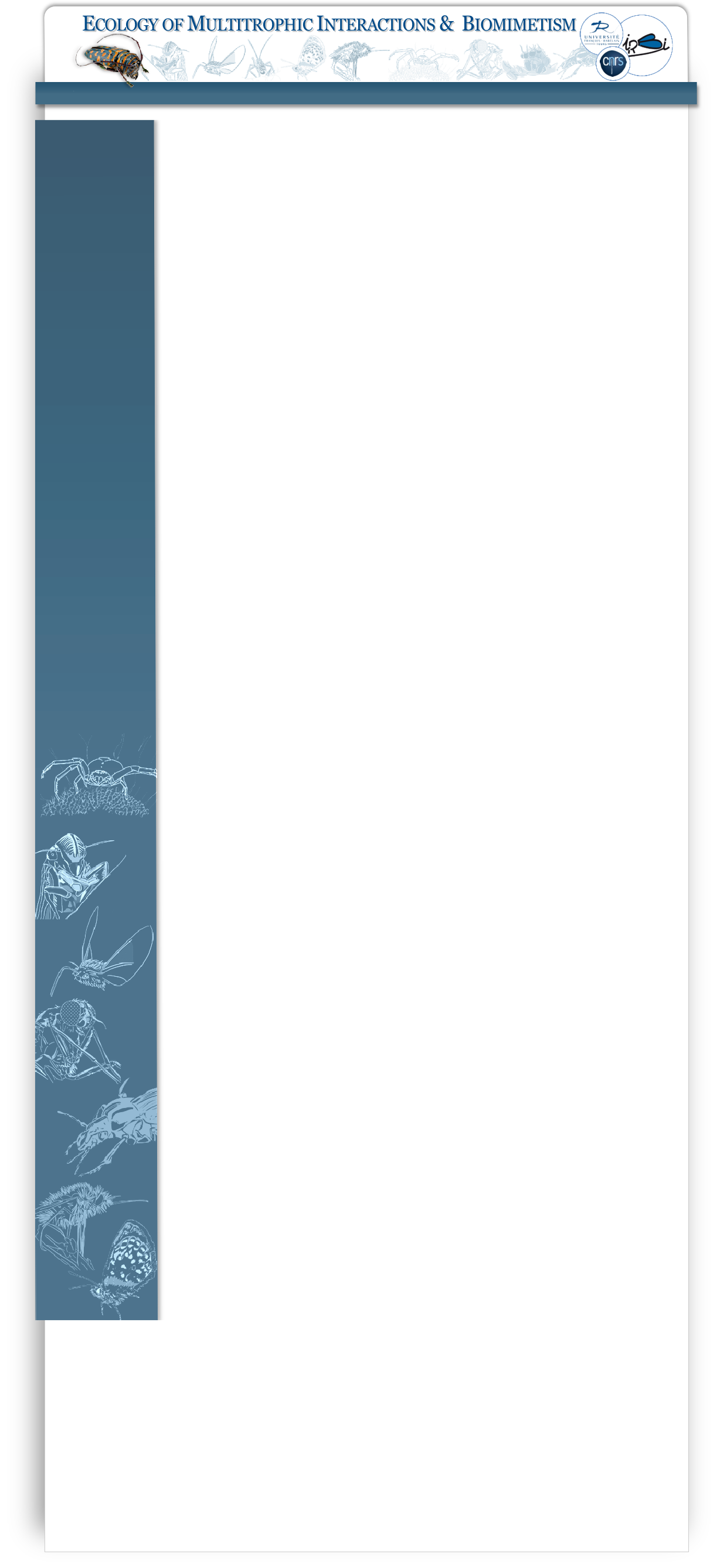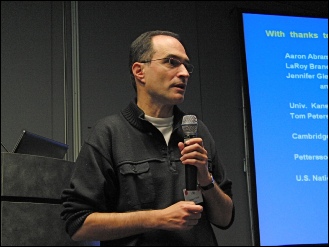


Bacher, S., J. Casas & S. Dorn (1997). Substrate vibrations elicit defensive behaviour
in leafminer pupae. Journal of Insect Physiology, 43: 945-
Meyhöfer, R., J. Casas & S. Dorn (1997). Mechano-
Meyhöfer, R., J. Casas & S. Dorn (1997). Vibration mediated interactions in a host-
Casas, J. & M. Aluja (1997). The geometry of search movements of insects in plant
canopies. Behavioral Ecology, 8: 37-
Bacher S., J. Casas & S. Dorn (1996). Parasitoid vibrations as potential releasing
stimulus of evasive behaviour in a leafminer. Physiological Entomology, 21: 33-
Blanché S., J. Casas, F. Bigler & K.E. Janssen-
Meyhöfer, R., Casas, J. & S. Dorn (1994). Host location by a parasitoid using leafminer
vibrations: Characterising the vibrational signals produced by the leafmining host.
Physiological Entomology, 19 : 349-
Casas J. & B. Hulliger (1994). Statistical analysis of functional response experiments.
Biocontrol Science and Technology, 4 : 133-
Casas J. & R. Meyhöfer (1994). Methoden zur kontinuierlichen Laborzucht von Apfelminiermotten
des Artenkomplexes Phyllonorycter blancardella Fabr. (Lep. Gracillariidae) und seiner
Parasitoide. Journal of Applied Entomology, 117: 530-
Casas J., W.S.C. Gurney, R. Nisbet & O. Roux (1993). A probabilistic model for the
functional response of a parasitoid at the behavioural time scale. Journal of Animal
Ecology, 63:194-
Casas J. (1990). Multidimensional host distribution and non-
Casas J. (1989). Foraging behaviour of a leafminer parasitoid in the field. Ecological
Entomology 14: 257-
Casas J. (1988). Analysis of searching movements of a leafminer parasitoid in a structured
environment. Physiological Entomology 13: 373-

Prof. Jérôme Casas
Born in 1961 in the foothills of the Swiss Jura Mountains, Jérôme Casas obtained
his Ph.D. from the ETH Zurich in 1989. After a short post-
His research interests span physiology and ecology, including work on the physical
ecology of insects; the physiology, behavior and population dynamics of consumer-
From 2001 to 2008, he was the director of the Institut de Recherche sur la Biologie
de l’Insecte (UMR CNRS), one of the largest institutions in Europe working on insects
(60+ scientists), during which time he hired several internationally recognized scientists
from abroad. He is also strongly committed to teaching, through the successive directorship
of two master degrees and through the daily formation of students; several of his
students and post-
He has contributed and contributes to many national and international scientific
boards, the most notable being BIOKON-
He was awarded the ETH medal for a thesis in the University’s top 10%, was nominated
both junior and subsequently senior member of the IUF (Institut Universitaire Français)
and was the Distinguished Invited Professor of the Center for Insect Science at the
University of Arizona in Tucson in 2006. Prof. Casas also serves on the editorial
board of a number of ecological and physiological journals – From Oecologia, to Biology
Letters, Current Opinion in Insect Science or Interface, including serving as the
co-


His research interests span physiology and ecology, including work on the physical
ecology of insects; the physiology, behavior and population dynamics of consumer-
From 2001 to 2008, he was the director of the Institut de Recherche sur la Biologie
de l’Insecte (UMR CNRS), one of the largest institutions in Europe working on insects
(60+ scientists), during which time he hired several internationally recognized scientists
from abroad. He is also strongly committed to teaching, through the successive directorship
of two master degrees and through the daily formation of students; several of his
students and post-
He has contributed and contributes to many national and international scientific
boards, the most notable being BIOKON-
He was awarded the ETH medal for a thesis in the University’s top 10%, was nominated
both junior and subsequently senior member of the IUF (Institut Universitaire Français)
and was the Distinguished Invited Professor of the Center for Insect Science at the
University of Arizona in Tucson in 2006. Prof. Casas also serves on the editorial
board of a number of ecological and physiological journals – From Oecologia, to Biology
Letters, Current Opinion in Insect Science or Interface, including serving as the
co-

Institut de Recherche sur la Biologie de l'Insecte
UMR 7261 Faculté des Sciences et Techniques
Avenue Monge, Parc Grandmont
37200 TOURS (France)


Keywords :
Integrative biology
Organismal biology
Functional ecology
Quantitative ecology
Population dynamics
Community dynamics
Climate change biology
Nature inspired technology
Agroecology-Agroforestry
Arthropod biology
Multitrophic interactions
Ecomechanics
Insect natural history
Human resource manag.
Institutional gouvernance
